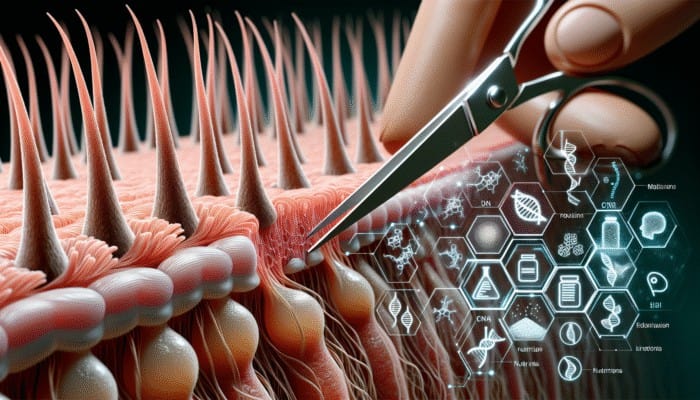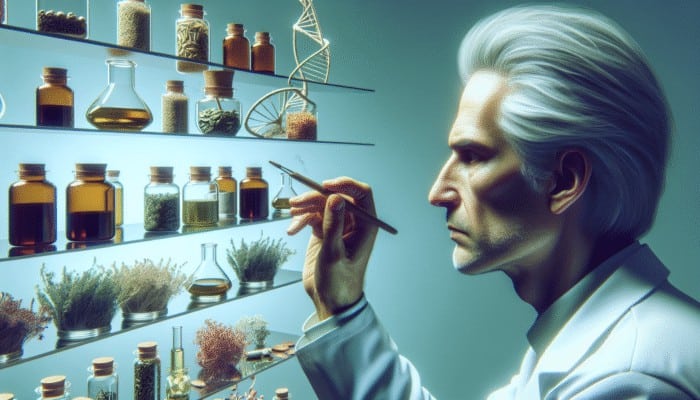Debunking Common Myths About Hair Treatments
Understanding the Truth: Does Cutting Hair Accelerate Growth?

Hair Treatment Myths: The persistent myth that cutting hair can hasten its growth has been widely accepted in the beauty community. However, understanding the biological processes behind hair growth reveals otherwise. Hair growth primarily originates from hair follicles, which are deeply influenced by genetics, overall health, and hormonal balance. Individual genetic predispositions and nutritional intake predominantly determine the rate at which hair grows. Therefore, trimming hair does not impact the underlying hair follicles that regulate how quickly hair can grow.
Many people mistakenly believe that trimming hair leads to faster growth due to the immediate visual effects of a fresh cut. When split ends are removed, hair often appears thicker and healthier, creating the illusion of increased growth. This situation exemplifies the classic confusion between correlation and causation; while the hair may look revitalised, the growth rate remains unchanged. This temporary enhancement in volume can boost self-esteem, reinforcing the belief that hair is growing faster following a trim.
Individuals seeking to promote healthier hair growth should adopt several effective strategies. Firstly, it is crucial to maintain a well-balanced diet rich in essential vitamins and minerals. Nutrients such as biotin, omega-3 fatty acids, and proteins are vital for fostering growth from within. Additionally, nurturing scalp health through gentle massages and appropriate hair care products can stimulate the follicles, creating optimal conditions for growth. Protecting hair from environmental stressors and reducing excessive heat styling preserves its health and longevity.
Moreover, the psychological benefits of regular hair trimming can foster a sense of renewal and contribute to a perception of healthier hair. This emotional response can enhance self-esteem, leading individuals to feel more confident in their appearance. Trimming hair can be seen as a proactive measure towards refreshing one’s look, reinforcing the belief that such practices positively influence hair growth. However, experts in hair care consistently stress that while trimming is beneficial for maintaining hair health, it does not directly affect growth rate or thickness.
In conclusion, despite the widespread belief that cutting hair stimulates its growth, it is essential to recognise that hair growth is primarily governed by genetics, diet, and overall health. Prioritising nutrition and scalp care is significantly more beneficial than relying solely on trimming for effective hair growth.
Dispelling the Myth: Does Frequent Shampooing Lead to Hair Loss?
Many individuals believe that frequent shampooing contributes to hair loss, a misconception that has been widely propagated across various communities. In truth, shedding hair is a natural component of the hair growth cycle, with the average person losing between 50 and 100 strands daily. This shedding process bears no relation to how often one shampoos one's hair. Understanding this natural cycle is vital in alleviating fears associated with regular washing routines.
Shampooing plays a critical role in sustaining scalp health and hygiene. Selecting the right shampoo can effectively remove dirt, oil, and product build-up, which could otherwise lead to scalp issues. Choosing shampoos that align with your specific hair type and scalp conditions is essential. For example, individuals with oily hair may benefit from more frequent washing, while those with dry or curly hair should wash less often to maintain essential oils. Using gentle and hydrating shampoos is key to ensuring hair health and keeping the scalp balanced and nourished.
Extensive research has been conducted to explore the relationship between shampooing frequency and hair loss. Studies, including one published in the *Journal of Dermatology*, have found no significant evidence linking hair loss to how often one shampoos their hair. This challenges the conventional notion that frequent washing leads to increased shedding and reinforces the idea that genetics, hormonal changes, and underlying medical conditions are the primary drivers of hair loss.
For optimal hair health, it is advisable to select shampoos free from harsh chemicals, such as sulfates and parabens, as they can lead to dryness and damage. Moreover, a suitable conditioner can help maintain moisture levels in the hair, reducing the risk of breakage and enhancing its overall appearance. Striking a balance in washing frequency is essential; it is vital to listen to the needs of your hair and scalp rather than following strict washing guidelines based on myths.
In summary, the belief that frequent shampooing causes hair loss is unfounded. Prioritising scalp health, selecting appropriate products, and understanding the natural hair growth cycle are far more important for maintaining hair integrity than worrying about how often to shampoo.
Brushing Hair Excessively: A Myth for Healthier Locks
The idea that brushing hair 100 times a day promotes healthier locks is an outdated myth, largely rooted in practices from the Victorian era. During that time, it was commonly believed that excessive brushing could distribute natural oils, resulting in a lustrous appearance. However, this antiquated viewpoint disregards modern hair care knowledge and the potential damage caused by excessive hair manipulation.
Overbrushing can be detrimental, particularly on wet hair, which is more susceptible to breakage. Excessive brushing can cause hair to become frayed, leading to split ends and an unhealthy look. Different hair types also dictate the appropriate frequency of brushing. For instance, individuals with fine or delicate hair might find less frequent brushing necessary to avoid damage. In contrast, those with thicker, coarser hair may handle more brushing without significant harm.
Contemporary hair care experts advocate for a more personalised approach to brushing. Rather than adhering to a rigid number of strokes, individuals should focus on gentle detangling techniques that minimise breakage. Employing a wide-tooth comb or a brush designed for detangling can significantly reduce the risk of damage, especially for curly or coily hair textures. Using a leave-in conditioner or detangling spray can enhance the brushing experience, making it smoother and protecting the hair from unnecessary stress.
Expert opinions regarding the myth of excessive brushing reveal a consensus that customised hair care routines are far more effective than following outdated practices. Dermatologists and trichologists often emphasise the importance of understanding individual hair needs, advising against the one-size-fits-all methodology of brushing 100 times. Instead, they recommend developing a brushing routine that nourishes the hair and preserves health.
In conclusion, the myth that excessive brushing leads to improved hair health is a misconception that overlooks the complexities of modern hair care. The most effective way to maintain healthy, vibrant hair is to practice mindful brushing habits tailored to individual hair types.
Examining the Myth: Can Grey Hair Be Reversed Naturally?

The belief that grey hair can be reversed using natural remedies is a widespread myth that merits careful consideration. Grey hair results from decreased melanin production within hair follicles, a process primarily influenced by genetics and age. Unfortunately, there is no scientifically proven natural method to reverse this biological change, and many claims surrounding supplements and home remedies lack robust scientific support.
Common misconceptions about grey hair include the belief that stress significantly contributes to this phenomenon. While stress can lead to temporary hair loss, its direct link to greying remains largely unsupported by research. Studies suggest that genetic predisposition plays a more significant role in determining when and how quickly an individual experiences greying. Recognising this reality is crucial for embracing the natural ageing process and its accompanying changes.
For those encountering grey hair, embracing this transformation can represent a positive step towards self-acceptance. Many hair care brands now offer products specifically designed for grey hair, catering to its unique texture and requirements. These products can enhance the appearance of grey hair, providing styling and maintenance options that celebrate rather than conceal silver strands. Accepting grey hair can also be a powerful expression of individuality and confidence.
While various nutritional supplements—such as vitamin B12 and folic acid—are frequently touted as potential solutions for reversing grey hair, evidence supporting their effectiveness is limited. Although these vitamins are essential for overall hair health, they do not directly influence melanin production. As a result, it is vital to manage expectations regarding the impact of dietary changes on grey hair.
The psychological effects of greying can be considerable, influencing self-esteem and mental health. Many individuals struggle with societal perceptions of beauty as they age. Acknowledging that going grey is a natural part of life can foster a healthier relationship with oneself, leading to a more positive perspective on the ageing process.
To summarise, the notion that grey hair can be reversed through natural means is a myth lacking scientific validation. Embracing grey hair with proper care and a positive mindset can cultivate greater confidence and self-acceptance during ageing.
Are All Natural Hair Products Truly Superior?
Recently, the beauty industry has experienced a notable surge in the popularity of natural hair care products. However, the term ‘natural' can often be misleading. While many consumers assume natural products are inherently superior for hair health, examining the ingredients and their potential effects is crucial, as some natural components can be harsh on hair.
The definition of ‘natural' in hair products can vary greatly from one brand to another, and regulatory standards for this classification are often inconsistent. Ingredients derived from nature are not automatically benign; for example, some essential oils may cause scalp irritation or allergic reactions. Therefore, consumers must scrutinise labels and understand the implications of the ingredients they apply to their hair. Prioritising the efficacy of specific ingredients—rather than solely their natural origin—can lead to more informed product choices.
When assessing hair care products, it is beneficial to consider individual hair types and specific concerns. For instance, those with curly hair may prefer products containing natural oils for added moisture, while individuals with fine hair might require lightweight formulations that do not weigh hair down. The key is to select products that cater to personal hair needs rather than simply following trends based on the allure of the ‘natural' label.
Additionally, many synthetic ingredients have been scientifically formulated to deliver benefits that may not be available in natural alternatives. For example, silicone, although synthetic, can provide excellent heat protection and smoothness, making it effective for various hair styling needs. Understanding the role of diverse ingredients and their performance can assist in making choices that prioritise hair health and desired outcomes.
In conclusion, while the appeal of ‘natural' hair products is understandable, it is vital to approach this trend with a critical mindset. Evaluating the ingredients and their suitability for hair type is far more essential than merely opting for products based on the allure of being ‘natural'.
Does Hair Dye Lead to Hair Loss?
The belief that hair dye causes hair loss is a common concern among individuals who enjoy changing their hair colour. While it is true that hair dye can potentially damage the hair shaft, it does not directly lead to hair loss. Understanding this distinction is crucial for anyone aiming to enhance their appearance through colour treatments.
Hair dye alters the hair's natural structure, which can result in dryness and brittleness. This damage is often exacerbated when harsh chemical dyes or dyeing processes are improperly conducted. However, the actual impact on hair loss is relatively minimal. Strands may appear thinner or seem to fall out due to breakage, but this is distinctly different from the loss of hair follicles.
Adhering to safe hair dyeing practices is essential to mitigate potential damage from hair dye. This includes conducting patch tests to avoid allergic reactions and using formulated products to minimise damage. Preparing the hair before dyeing, such as through deep conditioning treatments, can strengthen strands, making them less susceptible to the harsh effects of dye. Moreover, considering alternative methods, such as semi-permanent dyes or natural options like henna, can be effective for achieving colour without exacerbating damage.
For those concerned about hair health while colouring, consulting a professional stylist can guide the best methods and products, ensuring that the dyeing process is safe and effective. Regular trims can also help maintain the integrity of the hair, reducing the appearance of damage and promoting healthier growth.
In summary, while hair dye can cause some degree of damage to the hair itself, it does not directly result in hair loss. By employing safe dyeing techniques and making informed product choices, individuals can enjoy the aesthetic benefits of hair colour without compromising the health of their hair.
Frequently Asked Questions About Hair and Hair Care

Does trimming my hair impact its growth rate?
No, trimming hair does not influence its growth rate. Hair growth occurs at the follicle level and is primarily affected by genetics and overall health, not the frequency of trims.
Is washing my hair every day harmful?
Washing hair daily may not be necessary for everyone. It largely depends on hair type; oily hair may benefit from daily cleansing, while dry or curly hair might require less frequent washing to maintain moisture.
How often should I brush my hair for optimal health?
Brushing frequency depends on hair type. Properly detangling once or twice a day is typically sufficient; excessive brushing should be avoided to prevent breakage and damage.
Can grey hair revert to its original colour?
Currently, there are no scientifically proven methods to reverse grey hair naturally. Grey hair results from genetic factors and reduced melanin production.
Are natural hair products always the best choice for my hair?
Not necessarily. While natural products can benefit hair, some natural ingredients may be harsh. It is essential to assess ingredients and their effects based on individual hair types.
Does hair dye contribute to thinning hair?
Hair dye can cause damage to the hair shaft, which may lead to breakage and the appearance of thinning hair. However, it does not directly cause hair loss from the follicles.
Are there specific foods that promote hair growth?
Foods rich in vitamins A, C, D, E, zinc, iron, and omega-3 fatty acids support hair growth. A balanced diet can enhance overall hair health and promote growth.
Is stress a significant contributor to greying hair?
While stress can lead to temporary hair loss, its direct connection to greying hair is largely unsupported. Genetics is a more significant factor influencing when and how quickly hair greys.
Should I stop shampooing if my hair is thinning?
No, avoiding shampooing is unnecessary. Instead, focus on using gentle, suitable products that maintain scalp health, which can help support hair vitality.
How can I improve the condition of my dyed hair?
To maintain healthy dyed hair, utilise colour-safe shampoos and conditioners, minimise heat styling, and schedule regular deep conditioning treatments to nourish and protect the hair.


Desmond Chisulo
May 29, 2025This exploration of hair growth myths is particularly relevant in a culture increasingly focused on health and beauty standards, where misinformation can often lead to misguided practices. The belief that hair cutting accelerates growth reflects a broader trend in our society: the preference for quick fixes over understanding the underlying biological processes at play.
Amitys Hair Salon
November 19, 2025You’re spot on! Our culture really does thrive on that quick-fix mentality. It’s like we want our hair to grow as fast as we swipe on our phones. But the myth about haircuts speeding up growth is almost like trying to speed up a parking lot line by yelling at the people in front of you—it just doesn’t work that way!
Clementine Matsui
September 2, 2025This post touches on a common misconception that resonates with so many people. I think the myth that cutting hair accelerates growth can be traced back to how we perceive hair health. It’s interesting how a fresh haircut can uplift our mood and enhance our appearance, leading many to mistakenly equate this with actual hair growth.